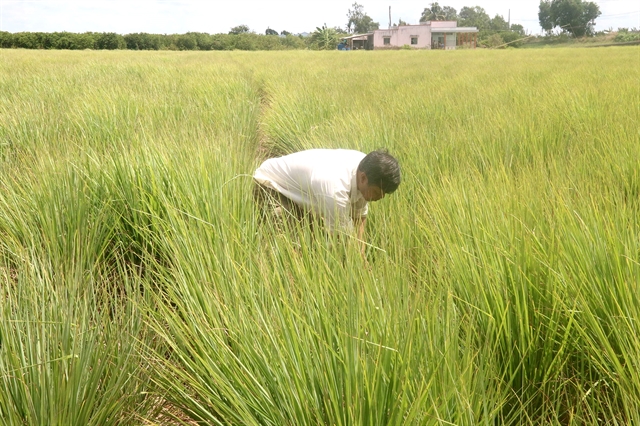 Society
Society

Tân Phú Đông District in Tiền Giang Province has converted more unproductive rice fields and is growing lemongrass on them to adapt to climate change and improve farmers’ incomes.

|
| Lemongrass fields in Tiền Giang Province’s Tân Phú Đông District. — VNA/VNS Photo Minh Trí |
TIỀN GIANG — Tân Phú Đông District in Tiền Giang Province has converted more unproductive rice fields and is growing lemongrass on them to adapt to climate change and improve farmers’ incomes.
The coastal district in the Cửu Long (Mekong) Delta is an island in the Tiền River, a tributary of the Mekong that is normally severely affected by saltwater intrusion during the dry season.
Before 2018 the district grew mostly rice and only one crop a year with low yields.
Local authorities began to encourage farmers to raise shrimp and grow drought-resistant plants such as soursop and lemongrass to cope with the salt intrusion.
Lemongrass is an ideal crop considering the district’s natural conditions and offers farmers higher incomes than rice.
The district has 3,600ha of former rice fields under lemongrass, up 1,200ha since last year and the largest in the province.
Farmers grow two to three lemongrass crops a year and earn VNĐ50-60 million (US$2,000-2,500) per hectare, three times the income from the single rice crop they used to manage.
Lê Văn Tốt has converted his 2ha rice field and harvests an average of 75 tonnes of lemongrass a year.
This year he sold his crop for VNĐ5,000 a kilogramme and earned VNĐ150 million ($6,300), he said.
Thanks to the new crop his family has become wealthy, he said.
Lemongrass grows in all types of soil, requires little spending, is affected by few diseases, but provides high yields, he said.
Bùi Thái Sơn, secretary of the district Party Committee and chairman of its People’s Committee, said lemongrass is a spice and medicinal plant with high economic value that is ideal for growing in the local alum-affected soil.
The district encouraged farmers whose rice fields were affected by alum and had low yields to switch to lemongrass, he said.
It also taught them how to grow the spice, he said.
The district has been zoned with concentrated areas in Phú Thạnh and Phú Đông communes for farming lemongrass, shrimp and fruits.
Its lemongrass has been granted geographical indication by the National Office of Intellectual Property, and this has helped improve its brand name and competitiveness.
It has high quality and oil content, and so is preferred around the country.
To guarantee demand and steady prices the district has also encouraged farmers to establish co-operatives and link up with companies that will buy their lemongrass.
In Phú Thạnh Commune, authorities have helped farmers establish the Tân Phú Đông Lemongrass Producing Co-Operative and adopt bio-safety standards.
Nguyễn Văn Hùng, its director, said the co-operative buys lemongrass from its members at a price of VNĐ200-300 a kilogramme higher than market prices.
It is looking for companies to sign long-term contracts with, he said.
“The members know how to grow clean and safe lemongrass, and we are willing to meet companies’ required standards such as Vietnamese good agricultural practices.”
The number of members has increased from 28 when the co-operative was established in 2020 to 62, who grow a total of 50ha of lemongrass, now. — VNS